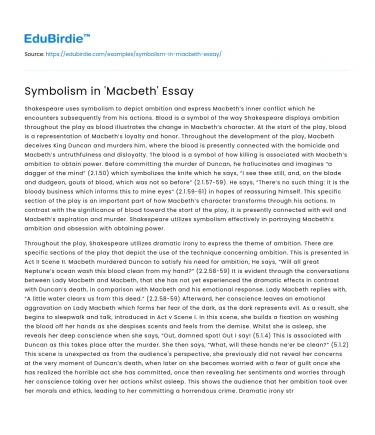Shakespeare uses symbolism to depict ambition and express Macbeth’s inner conflict which he encounters subsequently from his actions. Blood is a symbol of the way Shakespeare displays ambition throughout the play as blood illustrates the change in Macbeth’s character. At the start of the play, blood is a representation of Macbeth’s loyalty and honor. Throughout the development of the play, Macbeth deceives King Duncan and murders him, where the blood is presently connected with the homicide and Macbeth’s untruthfulness and disloyalty. The blood is a symbol of how killing is associated with Macbeth’s ambition to obtain power. Before committing the murder of Duncan, he hallucinates and imagines “a dagger of the mind” (2.1.50) which symbolizes the knife which he says, “I see thee still, and, on the blade and dudgeon, gouts of blood, which was not so before” (2.1.57-59). He says, “There’s no such thing: it is the bloody business which informs this to mine eyes” (2.1.59-61) in hopes of reassuring himself. This specific section of the play is an important part of how Macbeth’s character transforms through his actions. In contrast with the significance of blood toward the start of the play, it is presently connected with evil and Macbeth’s aspiration and murder. Shakespeare utilizes symbolism effectively in portraying Macbeth’s ambition and obsession with obtaining power.
Throughout the play, Shakespeare utilizes dramatic irony to express the theme of ambition. There are specific sections of the play that depict the use of the technique concerning ambition. This is presented in Act II Scene II. Macbeth murdered Duncan to satisfy his need for ambition, He says, “Will all great Neptune’s ocean wash this blood clean from my hand?” (2.2.58-59) It is evident through the conversations between Lady Macbeth and Macbeth, that she has not yet experienced the dramatic effects in contrast with Duncan’s death, in comparison with Macbeth and his emotional response. Lady Macbeth replies with, “A little water clears us from this deed.” (2.2.58-59) Afterward, her conscience leaves an emotional aggravation on Lady Macbeth which forms her fear of the dark, as the dark represents evil. As a result, she begins to sleepwalk and talk, introduced in Act v Scene I. In this scene, she builds a fixation on washing the blood off her hands as she despises scents and feels from the demise. Whilst she is asleep, she reveals her deep conscience when she says, “Out, damned spot! Out I say! (5.1.4) This is associated with Duncan as this takes place after the murder. She then says, “What, will these hands ne’er be clean?” (5.1.2) This scene is unexpected as from the audience's perspective, she previously did not reveal her concerns at the very moment of Duncan’s death, when later on she becomes worried with a fear of guilt once she has realized the horrible act she has committed, once then revealing her sentiments and worries through her conscience taking over her actions whilst asleep. This shows the audience that her ambition took over her morals and ethics, leading to her committing a horrendous crime. Dramatic irony strongly affects how the audience can make assumptions about the characters, mainly Macbeth and Lady Macbeth.
Save your time!
We can take care of your essay
- Proper editing and formatting
- Free revision, title page, and bibliography
- Flexible prices and money-back guarantee
Foreshadowing is used to portray the theme of ambition demonstrated in Macbeth’s actions. When Macbeth first committed Duncan’s death, he reveals his hands which are covered with blood when he shows Lady Macbeth. This indicates and foreshadows that he is going to commit more murders and violent acts. Later in the play, she hallucinates about her involvement in Duncan’s murder. Another example of where foreshadowing is demonstrated is when the witches predict that Macbeth will become king of Scotland and that Banquo will be an ancestor to kings without ruling himself. The predictions that the witches provided Macbeth foretell the events that occur later in the play, for example, Duncan’s death. This reveals a sense of ambition in Macbeth, as he changes his actions to encourage the events to happen, whilst also preventing the prophesies from coming true when he flees to Ireland.






 Stuck on your essay?
Stuck on your essay?

